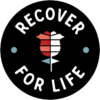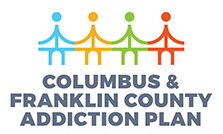RECOVER FOR LIFE
The disease of addiction has hit Franklin County hard and we are ready to recover. We know that recovery won’t happen overnight. It isn’t a one-time thing we get over and move on from, it’s a constant ongoing battle. That’s why we’re in this for the long haul, helping our residents recover for life. Together, we recover from addiction and the stigma that surrounds this disease.
MORE THAN THE ADDICTION
Our perceptions of addiction fail to paint a complete picture. Every individual is more than their addiction and should have the opportunity to become the person they want to be. These profiles chronicle Franklin County residents’ recovery journeys and paint a picture of each person’s identity despite their struggles with the disease of addiction.
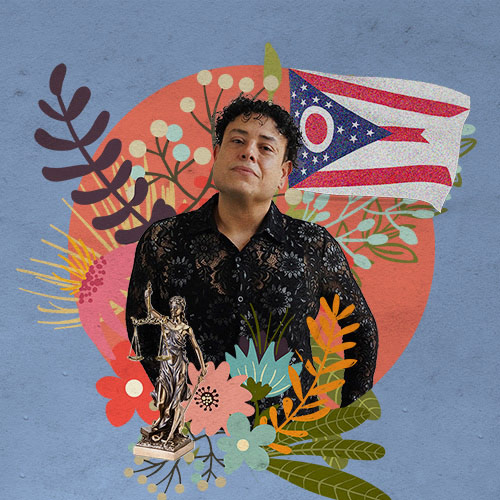
My name is Gambit Stuart Aragón III. I’m originally from Nicaragua, but today I live in Columbus, Ohio. These days, I’m working as a case manager for an MS medication, and I’m a member of the Civilian Review Board.
There was political unrest in Nicaragua when I was growing up, and I experienced a lot of trauma. And in our culture, that kind of trauma is often not addressed. Your mental health and self-care were not things people really discussed. In addition, I was taught that if you worked hard, you could have all these things. But that isn’t always true. And when it didn’t happen for me, it gave me low self-esteem. So in my twenties, I started to use substances to mask the trauma and my feelings of low self-worth. That combination put me through some really low years when I felt like I was trying to kill myself slowly.
My journey with recovery started through a realization. I had been through so much – sexual trauma, civil war, living in the '90s as a queer person – that I wasn’t about to let a substance take me out. It was from that realization and that sense of confidence that I found the momentum I needed to find recovery.
A few things have influenced me along the way. First, I saw how badly people struggling with addiction need to be welcomed regardless of their gender, skin color, or orientation. And I learned how important it was for loved ones to accept people where they were along the recovery journey. I think these two things influence what I’m passionate about these days and my future goals.
I want to help others to have it easier than I had it. I want to break down fences and hold them for others to cross, creating more inclusivity within treatment and recovery but also across our political system. I’m even interested in working on inclusivity and equity legislation, especially for the LGBTQIA+ community.
If you’re still struggling with addiction, don’t compare yourself to others. Every journey is different, so just keep trying. To the families of those struggling, I urge you to keep the door open. That doesn’t mean enabling, but always leave room for that day they are ready to change. And to those with misconceptions about addiction, I would challenge you to see the humanity in everyone.
GAMBIT
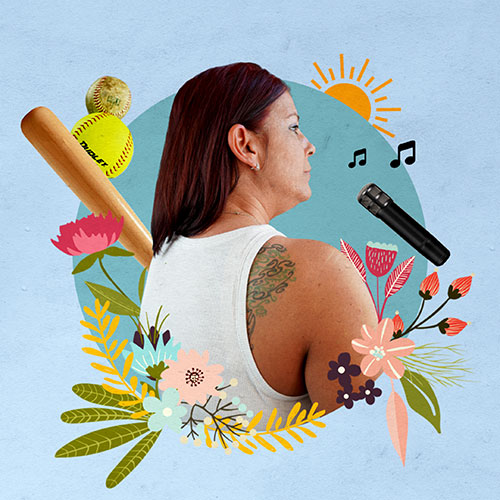
I'm Trina Barnhart. I was born and raised in Columbus, Franklin County. I've been at the same company for 23 years. Beyond my job, I am a two-time cancer survivor, a mom, a daughter, and someone's life support.
I grew up in a big Italian-American family with a lot of drinking. My first experience with alcohol came at a very young age. I started drinking with friends in my teenage and college years, but I could always stop. Between having kids, building scar tissue, exploratory surgeries, and miscarriages, I was in a lot of physical and emotional pain.
I started using substances to mask all of that pain. I didn't realize how much of a problem it was until I couldn't stop. I was watching my life spiral out of control. I admitted to myself and my family that I had a problem. And then I left to find help. I had to get away to be able to tackle my problem. I went and found the help I needed to rebuild who I was.
That's what I'm doing today. I'm exploring who I am. Almost every day, I learn new things about myself. I'm learning that I have the most incredible friends and family in this community. And I'm continuing to do the things I love, like softball, singing karaoke, and learning about healthy eating and fitness.
I received advice I would like to share with others: one by one by one. That means you can only take life by the minute, by the hour, and by the day.
There's still a lot of judgment and stigma out there toward addiction. But I would remind people that we're all addicted to something. That addiction doesn't define us. So when you see someone struggling with substance use, remind yourself that isn't all there is to them.
TRINA
 My name is Alex, I’m originally from California, but spent most of my childhood in Pittsburgh and Charleston. I’m on the board of Lower Lights Christian Health Center.
From a young age, I knew my father was an alcoholic. And I was determined not to be like him. However, a childhood trauma pushed me toward negative coping skills, and I started drinking around the age of 16. In college, it just felt like normal partying, but I never really turned that partying off. I dropped out of college and continued to drink heavily. When it came to work, I was always really successful, which somehow masked the problems. Because I continuously received promotions and new opportunities, and second chances. My ability to succeed masked many underlying problems – things from my past I wasn’t ready to face.
I knew I had to change when I found myself in a parking lot on the phone with my partner talking about how I didn’t want to live anymore. I gave myself a year to find reasons to keep going. That moment, dark as it was, acted as the start of my transformation. Despite my troubles, I’d been really lucky when it came to legal trouble or physical harm. And I found myself thinking there has to be a reason I’m not in jail or dead. I must have some purpose. And I had my learned experiences, ability to communicate my story, and a desire to bring something to the world.
That feeling, a desire to help others and my ability to be able to, is really important to me. Sitting on the Board of LLCHC, I can bring a voice of change to the table. In addition to providing a unique perspective, I want to implement initiatives that will help the organization remain diverse and inclusive. It isn’t just through my role on the board. I want to carve a more inclusive road for younger kids, my own family included, so they can live in a better world than the one I was brought up in. Of course, it isn’t all intense; when I’m not looking to make the world more inclusive, I love yoga and, most of all, my three dogs.
My name is Alex, I’m originally from California, but spent most of my childhood in Pittsburgh and Charleston. I’m on the board of Lower Lights Christian Health Center.
From a young age, I knew my father was an alcoholic. And I was determined not to be like him. However, a childhood trauma pushed me toward negative coping skills, and I started drinking around the age of 16. In college, it just felt like normal partying, but I never really turned that partying off. I dropped out of college and continued to drink heavily. When it came to work, I was always really successful, which somehow masked the problems. Because I continuously received promotions and new opportunities, and second chances. My ability to succeed masked many underlying problems – things from my past I wasn’t ready to face.
I knew I had to change when I found myself in a parking lot on the phone with my partner talking about how I didn’t want to live anymore. I gave myself a year to find reasons to keep going. That moment, dark as it was, acted as the start of my transformation. Despite my troubles, I’d been really lucky when it came to legal trouble or physical harm. And I found myself thinking there has to be a reason I’m not in jail or dead. I must have some purpose. And I had my learned experiences, ability to communicate my story, and a desire to bring something to the world.
That feeling, a desire to help others and my ability to be able to, is really important to me. Sitting on the Board of LLCHC, I can bring a voice of change to the table. In addition to providing a unique perspective, I want to implement initiatives that will help the organization remain diverse and inclusive. It isn’t just through my role on the board. I want to carve a more inclusive road for younger kids, my own family included, so they can live in a better world than the one I was brought up in. Of course, it isn’t all intense; when I’m not looking to make the world more inclusive, I love yoga and, most of all, my three dogs. ALEX
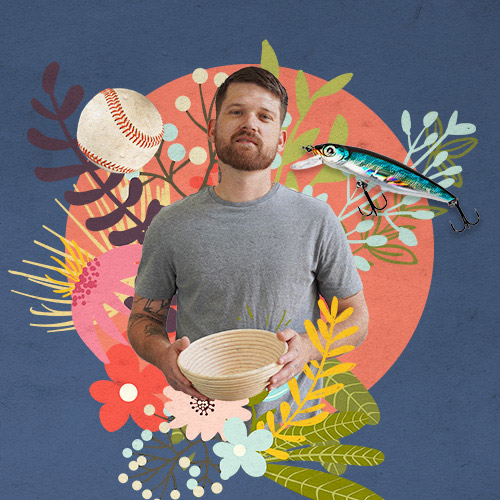
My name is Devon. I’m originally from Florida, now living in Columbus, Ohio. I’m a Care Coordination Supervisor for Franklin County Public Health, and I’m getting ready to go back to school to pursue a master’s degree in public health.
My earliest experiences with substance use came around middle and high school. I was a bit of an awkward kid. Drugs and alcohol gave me an easy in with a certain group of friends and made me feel more comfortable in my own skin.
I served in the military and after I got home, I was still the same person as I was before I joined, only now I had a lot of money saved up. I used that money to party with friends. When it ran low, I turned to more desperate measures. My behavior eventually made my family uncomfortable around me, and in some cases, unwelcomed. They kept me at arm’s length, but they never gave up on me. Over the years, they helped me find treatment, but I wasn’t ready until I hit a low when my spouse left me because of my addiction. My family had a place lined up for me here in Columbus. This time around, I was ready for the self-reflection and responsibility that leads to growth. Everyone’s recovery journey is different, but I found strength through my faith. My faith and my self-reflection pushed me to do the work on myself and gave me the opportunity to rebuild relationships – which I’m so grateful for.
Life now is so rewarding, full of a lasting joy that never fades. That feeling inspires me to take my recovery and use it to serve others. Service is something I’m passionate about, and it’s fueling my career and my decision to pursue a master’s in public health.
To those still struggling, I want you to know that there are people who still care about you, even when it doesn’t feel like it. To the families, I want to reiterate that the person struggling with addiction still needs you even when it feels like they’re pushing you away. And to those with misconceptions about addiction, if you look closely, addiction may not be far from you. So remember to be empathetic and open-minded.
DEVON
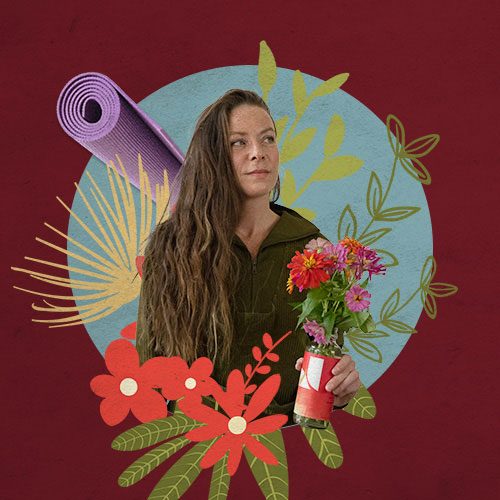
My name is Lianne, I’m originally from Oswego, Illinois but I’ve lived in Columbus since 2002. When I’m not looking after my two kids, I manage a yoga studio and teach hot yoga.
My father didn’t drink when we were kids because of his own struggles with alcohol. It wasn’t discussed openly, just sort of whispered about. My first experiences with alcohol came when I was maybe 15 years old drinking with friends, a pretty familiar story. Drinking was big in my high school and it’s something I continued doing into college, where I also got into drugs. I had some scary run-ins when using harder drugs and I was able to stop using drugs in the early 2000s. But I continued to drink and as the years went on, the drinking got heavier. Eventually, I started to put myself in some scary scenarios. Finally, I felt like I was putting myself and my kids in a bad situation. I reached out to a friend who was in recovery. And she was there for me, she helped me feel like I could do this.
Since then, I’ve been learning about myself. And finding that I am a badass and I can do this. Recovery is hard, but it also feels amazing. Yoga and meditation have been huge for me. Those are two things I’m really grateful for. I’m also so excited to watch my children become adults. I’m also really passionate about genuine connections. I think we’re all here to connect – so I’m focusing on the joy of connections and getting to know who people really are.
When you’re struggling with addiction, you often feel alone. To those who are feeling that way, you should know you’re not alone. For families, that honesty – sometimes brutal honesty – is really important to the recovery process. For the people struggling to understand why someone can’t stop using, I would urge them to remind themselves that it’s not about them. Those labels and stigmas push people further into addiction. Leaving the judgment at the door can go a long way.
LIANNE
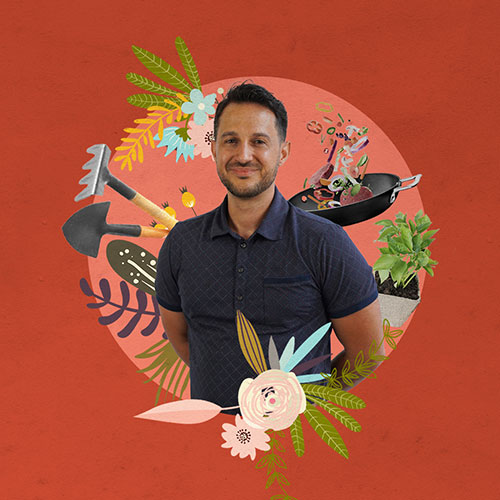
My name is Matthew, I'm from Columbus, and I'm the Care Coordination Division Supervisor for Franklin County Public Health.
My struggles with addiction started in my mid-twenties. I'd taken opioids before, both prescribed and from friends, and hadn't felt a strong desire to keep going because overall, I felt confident and happy with my life. But I hit a point where I thought I was underachieving, and some of that confidence was gone. So, I started taking opioids again because they allowed me not to focus on the parts of my life where I was unhappy. Taking opioids was really common at the time, especially among my friends. I went from taking them to selling them as well. I still felt like I was taking these to party and that it wasn't that serious. But eventually, I noticed withdrawal symptoms and realized how serious it was. I quit cold turkey, went through withdrawals, and made it a few months. But you know how the story goes. Outside stressors and life events would lead to a relapse. And I went through that cycle for a while. I'd quit on my own, get a few months along, and then relapse. I'd been so self-reliant when it came to quitting, but I saw myself repeating this cycle and finally knew I was ready for some professional help. After that, I went through a long treatment program with the help of my family, and I haven't looked back.
Recovery is awesome. My life has so much more in it than I could have ever imagined. I have a family I love and a job I find fulfilling. I find it exciting that I have no limitations, no boundaries, and I'm experiencing life by being present. A huge passion of mine is food. I love to cook, but I also love to garden and to grow my own ingredients. Learning about food and nutrition and bringing those things to the table is exhilarating. Feeding my family and others is so rewarding.
If you're still struggling with addiction, be honest and keep the dialog open. It's the silence that kills people. And for those families, don't give up. There are ways to still be present and helpful without enabling. Lastly, to all those with misconceptions about addiction, those negative labels and stereotypes stick with people, and eventually, they start to believe they are true, which only drives them further into addiction.
MATTHEW
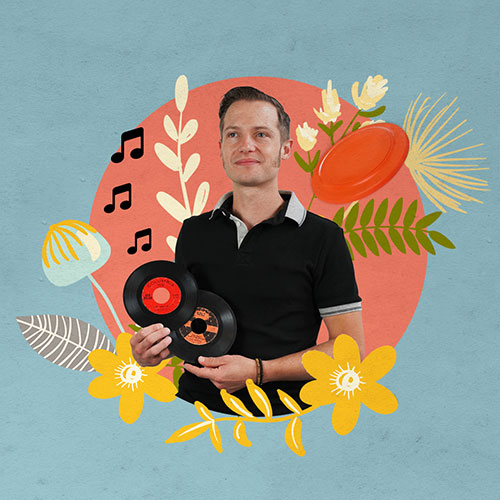
My name is Tyler, I'm originally from Troy, Ohio, and these days I'm working in customer advocacy.
Heavy drinking was something that was always around in my family to the point where it was completely normalized. So, by age 14, I was sneaking drinks with older relatives. I also had intense mood swings, which led to my parents sending me to a psychiatrist who put me on medications. When I came out at 16, all these people told me what I should be, and I lost myself. I found comfort in pills and alcohol. My time in active addiction is a blur; I was in and out of treatment and legal trouble, but manipulating the system was easy for me, and nothing stuck. Eventually, I landed in drug court, and the program resonated. It held me accountable because I had to get up and be there. And there were group therapy sessions where I found other people who understood what I was going through, even if they came from different walks of life.
Recovery feels surreal, like a dream. But recovery is full of immense gratitude. In some ways, I've had to re-learn how to be an adult. So every step feels like an achievement. I feel grateful to have a chance to get to know myself and learn about who I am. I'm also thankful for the opportunity to share my story, provide hope, and show myself and others that it's possible to have fun without substances.
Yoga has been so important to me. Addiction can put you in a state of chaos where you lack emotions and good relationship skills. Yoga has helped me be present in the moment so that I can focus on myself. I love frisbee golf, new restaurants, and going to shows when I'm not doing yoga.
If addiction still has a grip on you, don't be afraid to be uncomfortable. It's the only place where progress happens. If you have a family member struggling with addiction, don't give up on them. Learn how to love them, even if it's from afar. Everyone has addictions, even if they aren't substances. So I challenge people with misconceptions to think about addiction beyond just drugs and alcohol.
TYLER

My name is June Squires, and I live and work in Columbus. These days, I'm a mother to three children and a housing coordinator at Lighthouse Behavioral Health Solutions.
My first experience with substances was drinking alcohol and smoking marijuana at twelve. A lot of people in my family struggle with alcoholism, so it was something that I was raised into and seemed normal. I remember enjoying it right away because it allowed me to be someone completely different. It didn't take long for alcohol to lead to pills. By 18, I had my first baby. I was able to stop using substances while I was pregnant, but right after he was born, I picked up where I left off. My substance use progressed. Eventually, I was buying and selling heroin to pay for pills; this lifestyle led me to many run-ins with the law. One day, someone I was with told me we would never get sober. I remember thinking, maybe you won't, but I will. I was tired of being a slave to my addiction. The following day I went to a treatment center. In the past, I'd had periods of sobriety but hadn't addressed underlying trauma. This time, I started to talk about my feelings. That openness and honesty led me to recovery, not just short-term sobriety.
Recovery feels just amazing. I've learned that I can have a life beyond my wildest dreams. It allows me to have peace to sit in a room by myself and not feel angry or sad. I'm passionate about my children, watching them grow, and teaching them life skills, big and small. My clients mean a lot to me too. I absolutely love them, all 310 of them.
I have big plans for my future too. I'm looking to get my CDCA license so that I can be a licensed therapist. Goals and self-improvement are what keep us all moving forward.
If you're still struggling with addiction, I want you to know there is a better way of life. Take it one day at a time. Reach out and find a sponsor. In addiction, we're trapped in the gates of hell. Recovery is the complete opposite. In recovery, you're floating on the clouds of heaven.
JUNE

My name is Stephanie Mitchell Hughes. I'm originally from Cincinnati, Ohio, but I've lived in Columbus for 35 years. I'm an attorney. I live with major depressive disorder and suicidal ideation.
My first experience with depression came at 15 years old. I didn't have the language to understand or express what I was going through. I lived with that depression on and off for years, finding different ways to manage my feelings. After my now-former spouse left, I realized I had been depressed for at least a decade and did not know it. His departure unearthed a raging depression that I had never experienced. For the first time, I needed medication to treat it. This task was made more difficult because I did not have health insurance.
At the time, I represented abused and neglected children because children deserve outstanding legal representation. It was an honor to do that, but it provided challenges. As I struggled to pay bills, handle kids alone, and manage my feelings, much of what I had been pushing down finally came up.
This period revealed extreme depression. I did not recognize it, nor did I know how to deal with it, especially while supporting children. Regardless of how I felt, I kept getting up because of my children and the resilience my father had taught me. The three of us, we made it through those hard times. I'm proud of us for that.
Over time, I've learned and created different strategies for coping with depression, including taking care of myself and finding a good therapist and psychiatrist who evaluate my medications.
In 2014, I started telling my story because I had learned many different lessons over the years. You don't learn a lesson for your benefit; you learn the lesson to share it with somebody else. When I've shared what I'm going through, people thank me for expressing precisely what they're going through.
Sharing my story, passing along my lessons, and knowing my story has made other people feel heard have been therapeutic. I also tell my story to disrupt stigma and draw people's attention to existing resources. I want people to understand that they aren't the only ones suffering. If you are fighting depression, you're not alone. You're not weak. You are not defective. Hope and help are out there.
STEPHANIE
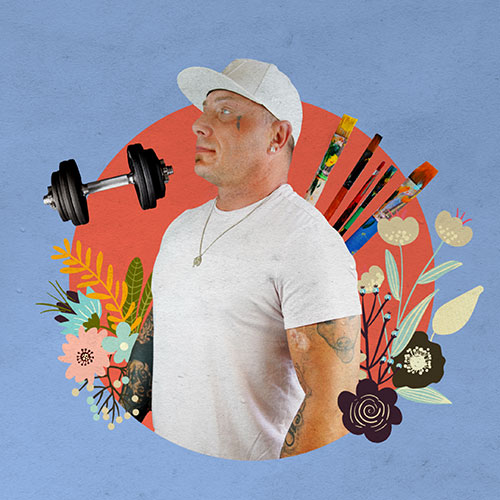
My name's Bradley Arnold, and I'm from Marion, Ohio. I'm going to school for addiction studies. On the side, I do graphics and painting, helping friends with branding and creative projects.
As a kid, I endured a lot of mental, physical, and sexual abuse from my dad and his friends. My first experience with substances was at six years old. They would give me alcohol, and they would laugh at me. I thought it was normal. From a young age, I saw drugs and alcohol as an escape.
When I got older, I joined the military. After an injury, I was prescribed OxyContin. It provided an even stronger escape, but it didn't take me long to realize that I was going downhill quickly. It was these years I view as my most active addiction. I tried rehab a few times. I often failed because I didn't know what it meant to really work the program and explore underlying causes. Through those years, I battled childhood trauma, combat-related PTSD, and the sickness and death of my parents, but I never dealt with the emotions associated with that.
One day there was a shooting around the corner involving some people I knew. I had this moment of clarity where I realized this wasn't what I wanted and not the lifestyle for someone with kids. I left a room full of drugs and people using substances and walked away to find something else. I finally accepted the pain and stopped masking it.
Life on the other side is amazing. It's a blessing. Not every day is easy, but I think if it were easy, I wouldn't appreciate it – no struggle, no progress. It's given me a chance to explore new hobbies. I've learned I love helping others and giving back. I like to do art. I love fitness and understanding health. I had no idea I could even read a book or think about a higher level of spiritual awakening.
My whole life, I've felt judged and seen as one thing. I wish other people would stop and take the time to ask, "What are you going through that's leading you to these decisions?" If you're still struggling, speak on it. Tell someone. And don't be discouraged if the first person doesn't give you what you need. Just keep sharing it, and keep searching. You will eventually find what you need. It's so worth it.
BRADLEY
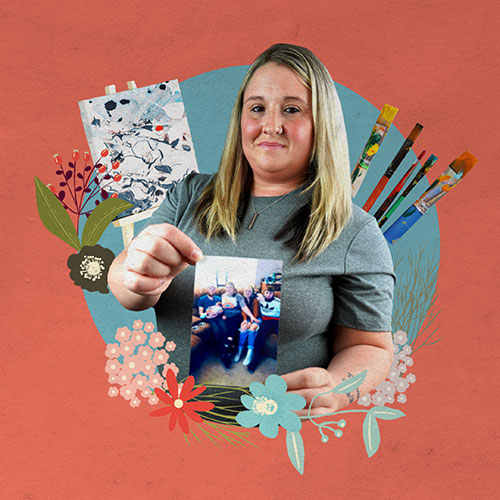
My name is Whitney Amber Reid. I was born and raised in Lancaster, Ohio, and live in Hilliard. I'm a Peer Recovery Supporter for Ohio State University Wexner Medical Center's Addiction Medicine Team.
My first experience with substance use was when I was fifteen. My boyfriend, at the time, was involved in selling and using substances. He was also verbally, physically, and emotionally abusive. It was a familiar cycle: he would put his hands on me and later say he was sorry and that he loved me. It was a co-dependent relationship and got to the point where it felt like I couldn't breathe without him. Throughout this relationship, we were also using drugs. Using turned to selling. And the substances went from Percocets to heroin and then fentanyl. Throughout those years, I'd have periods of sobriety. But often, my ex would come home, and the progress I'd made would fall apart.
I knew I had to find recovery. So I went to a treatment center. I remember during withdrawal, I saw one single beam of light coming through the window. That was my very first spiritual awakening. Seeing it, I knew I was ready to give myself to God and would have the strength to do this. I spent 14 months in treatment at Lighthouse. I haven't looked back.
Life on the other side is so much better. These days, I can do fun family activities like going to splatter paint or enjoying Disney movies with my kids. I love the joy of being a good mother; that's my biggest accomplishment. I'm also really passionate about shining a light on domestic violence and addiction. Educating people and spreading awareness about it is something I do in my daily life and in my job. You might have heard the expression, 'I recover out loud because people are dying silently.' That's the truth. I'm using my voice and experience to bring awareness to this issue. I'm even looking for some formal training on domestic violence.
If you're still struggling with substance use and reading this, I want you to know you're loved and worthy. Substances put lies in our heads about self-worth. And if you're not ready to see the light and walk toward it, I will sit with you in the darkness until you're ready.
WHITNEY

My name is Dana Brock. I was born and raised in Columbus, Ohio. As the quality assurance manager, I oversee our reentry program at Impact Community Action. When I'm not doing that or volunteering, I'm a student at Columbus State, pursuing my AAS in social work and my CDCA II in addiction studies.
I grew up around domestic violence in a house full of people drinking and using drugs. At six years old, I remember my stepfather saying, "Come here, boy. It's time to put some hair on your chest." He gave me some beer. It gave me a rush, and I started sneaking alcohol. By the time I was 10, I was somewhat of an alcoholic.
Eventually, some local gang members saw I was smoking weed and taught me how to sell drugs. I was initiated into gang life when I was about 14 years old. And by the time I was 17, I was heavily using and selling drugs. I was about 18 when I had my first child; a year later, I had a second. I was in and out of jail, but I saw other people's addictions and thought, "Well, I'm not begging for money." Until, one day, I was too.
I found myself incarcerated again after telling myself I wasn't coming back. Then one day, it hit me. I decided this would not be my legacy, and I started to pray and cry out to God to deliver me from everything that was not of him. I turned it around right then and there. It wasn't easy, but I started learning to be open, discussing my trauma, and discovering who I wanted to be.
I'm passionate about football. I played when I was younger, and I never miss an OSU game. I love movies -- I even did drama and theater in high school. I love to travel, too. I've been to 20 of the 50 states. And, of course, I love my family. They're the most essential thing in my life.
The best thing I can say to someone still struggling with addiction is, "Have an honest look and talk with yourself." Then find something – anything positive – and get yourself connected to it.
DANA

My name is Kevin, and I’m from Dublin, Ohio. Currently, I'm a peer supporter on the react team for Southeast Healthcare.
My experiences with addiction started in college when I was first introduced to cocaine. For the next fifteen years, substance use was all I cared about. It made me selfish, and I often neglected people who mattered. I think I liked getting high because it took me out of my element and allowed me to feel comfortable. During those years of addiction, I know I put a lot of people through a lot of hurt, especially my family. And in many ways, I didn't know what being in a relationship was supposed to look like. My first real turnaround came after violating probation. The Bell Center, where I went, had me focus on underlying behaviors rather than just on drug use. That place saved my life. It taught me about myself and helped to break down some of that ego that stands in the way of self-reflection. I admitted my shortcomings in front of a group of 20 other men. And they lifted me up and accepted me. Since that day, I haven't looked back.
My time in recovery has helped me to uncover the person I had the potential to be. It's helped me discover and fuel my passions. Those passions? Well, there's my family: being a good father and a good husband are so important to me. And then there's growth, which is just so crucial. I value my own growth, it’s why I'm finishing a bachelor's in psychology. And I love music. These days, I'm blending gospel and rap to make music that inspires me and hopefully others. Part of growth is knowing that I'll continue to find new passions and ways to contribute to the lives of others.
I don’t just value my own growth; I value the growth of others, especially those recently entering recovery or still struggling in active addiction. I care about these people; I love waking up every day and knowing I get a chance to show them what recovery did for me. To those struggling with addiction, I remind them that it can be overcome. To the families, understand that those struggling with addiction are not themselves, so be patient. And to those struggling to be empathetic toward people with addiction, remember they are still people, and we shouldn’t judge them, especially because no one is perfect.
KEVIN

My name is Jennifer. I'm from Missouri, but I've lived in Ohio for the last eight years. I spend my days working for a solar company and caring for my three amazing children.
Growing up, I knew there was a history of alcoholism in my family. I never thought much of it because it was always easy for me to control my drinking. As life got busier, I noticed I looked forward to those after-work cocktails too much. After becoming a mom, and moving to a new state, my drinking became habitual.
It wasn't long before I knew something needed to change. I needed to stop drinking to be the kind of mother I wanted to be. I knew I would never be fully present if alcohol was in my life. I quickly realized that it wasn't easy to stop and needed help. In April 2019, I sought treatment for my alcoholism. I stepped away so I could work on myself. That, combined with meetings with other members of the recovery community in Alcoholics Anonymous, has allowed me to grow in ways I never could have fathomed.
Today, recovery for me feels like a new life. I'm able to be fully present in the moment. Recovery takes bravery. There is no hiding from emotions - I face them head-on. Whenever I get through something hard, it's like winning a battle. My recovery means I can spend all my time doing what I love, like being with my kids, family, and friends.
My advice to others who are struggling is that you don't have to hit rock bottom for you to reevaluate your relationship with substances. There's never a bad time to get help. And it just takes one ounce of vulnerability to make that step for a whole new world to open up for recovery.
JENNY
RESOURCES FOR TREATMENT
Talking about and understanding opioid addiction is the first step.
Franklin County has the resources to help you start your recovery journey.
* ![]() Providers
Providers
DON'T FACE A CRISIS ALONE
Crisis Hotline
988
Call if you’re in crisis or need to talk to a trained professional.
PREVENT AN OPIOID OVERDOSE
At least one Franklin County resident dies from an opioid overdose every day.
We can help end the epidemic and the stigma by getting NARCAN®, the opioid overdose reversal drug.
This website was funded by a grant from the Centers for Disease Control Division of Overdose Prevention (DOP) National Center for Injury Prevention and Control (NCIPC).
© 2023 Recover for Life. All rights reserved.
